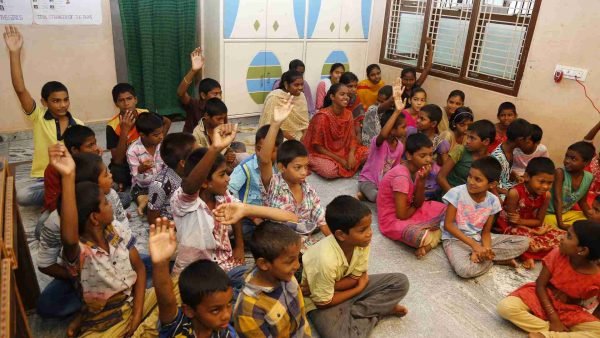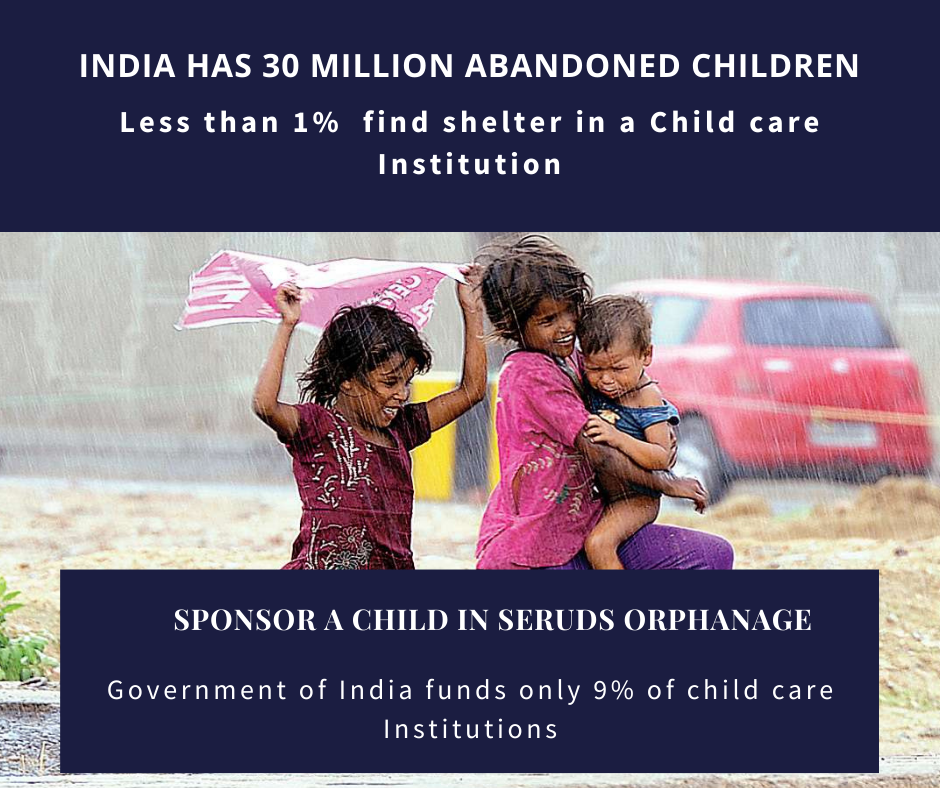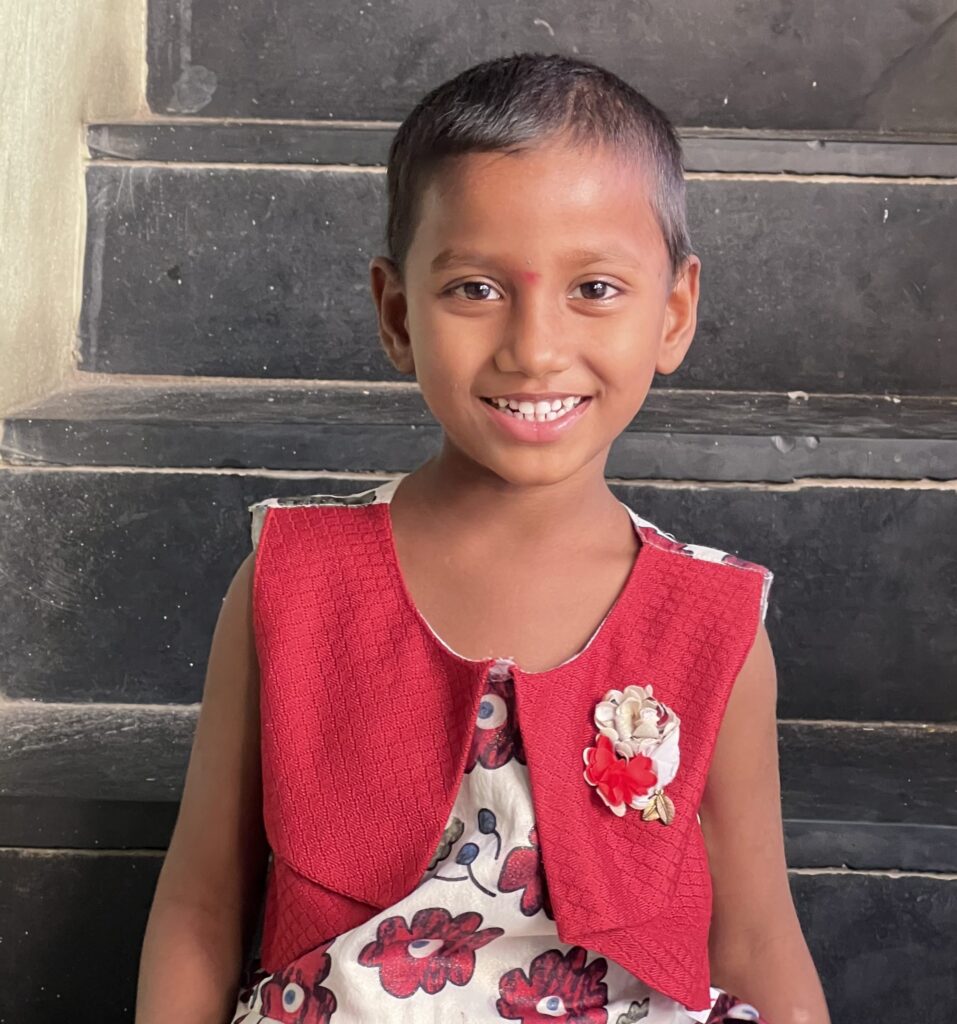
Orphans : The Forgotten Children of India
Donate to SERUDS Orphanage
FOREIGN DONORS – PAYPAL / Credit or Debit Cards Click Here
India is home to approximately 31 million orphaned and abandoned children, a number exceeding the entire population of Sri Lanka.
In 2017, only about 370,000 of these children resided in over 9,500 Child Care Institutions (CCIs).
These institutions provide shelter and basic necessities, but the challenges faced by orphans in India extend far beyond their early years.
Life of orphans in India
Upon reaching the age of 18, children in CCIs are required to leave, often with minimal support for independent living.
Studies indicate that nearly half of these young adults struggle to find paid employment, leaving them vulnerable to poverty and exploitation.
Despite policies mandating aftercare until the age of 21, many do not receive the support they are entitled to, exacerbating their hardships.
Such young adults are the state’s responsibility until they turn 21. This is a reassuring policy, but only in name. More than a 27 per cent had not received any form of aftercare and 44 per cent were not consulted in their care and rehabilitation planning, in September 2018 report of the Jena Committee. It found that many government officials as well as children were unaware of their aftercare being mandated by law.
It is shocking that the Planning Commission and the Government have never conducted a structured survey of orphan children, which includes street children who may maintain some contact with family. This is because there is no one to campaign for these vulnerable children : they are not a ‘vote bank’.
The mandate of Child Protection Services or CPS under the Government of India was to protect these vulnerable children. However, the coverage of this program has been less than 1 lakh children per year.
The study by the Ministry of Women and Child Development (MWCD) undertaken in 2016-17 has revealed that there are 9589 CCIs/Homes (registered/unregistered); 91 per cent of which are run by non-government organizations, and only 9 per cent are government supported. One in five districts in the country does not have even a single orphanage. A majority of districts does not have the minimum three orphanages needed (one for children of less than 6 years of age and one each for boys and girls of 6-18 years respectively).
The government’s annual expenditure on child protection (covering the entire gamut of child rights) is Rs 1500 crores : it amounts to less than Rs 2 per child per day, covering food, clothing, education and medical needs for the 30 million abandoned children!
In sharp contrast, the total expenditure on scholarships on OBC/SC/ST children in 2018-19 stood was Rs 7165.95 crores.
For children of SC / ST / OBC families, there are several benefits like reservation in institutions for higher education, coaching and hostels for competitive examinations, reservation in jobs, loans to set up a business and even sponsorship for studies abroad. Orphans, 70% of whom would belong to SC / ST or OBC categories, going by the proportion for the population, are not eligible for government scholarships. By the time they reach the age of 18, they have to pretty much fend for themselves. Orphans have no reservations to uplift them.
Adoption in India is consistently less than 6000 children per year, thus it has failed as a solution.
The number of children who are beneficiaries under CPS scheme during 2019-20 was only 75824, which is 0.25% of such vulnerable children.

Frequently Asked Questions
Can I directly adopt a child from an orphanage in India?
In India, adoptions are regulated by the Central Adoption Resource Authority (CARA). Prospective adoptive parents must register through CARA’s online system.
Direct adoptions from orphanages without CARA’s involvement are not permitted to ensure transparency and the child’s best interests.
What are the problems faced by orphans in India?
Orphans in India encounter numerous challenges, including lack of access to quality education, healthcare, and stable housing.
Upon leaving CCIs at 18, many struggle with unemployment, social stigma, and the absence of a support system, making them susceptible to exploitation and poverty.
Are there any famous orphans?
Yes, several notable individuals were orphaned and overcame significant challenges.
For instance, Sindhutai Sapkal, known as the “Mother of Orphans,” was an Indian social worker who dedicated her life to raising orphaned children
List of orphanages in India
A comprehensive list can be found through resources like the Ministry of Women and Child Development or various NGO directories.
NGO Base: This platform provides a detailed list of orphan homes and orphanages in India, including their locations and contact information.
Why are there so many orphans in India?
The high number of orphans in India can be attributed to factors such as poverty, disease, social issues, and inadequate access to healthcare.
Additionally, natural disasters and societal challenges contribute to the growing number of orphaned and abandoned children.
Top 10 orphanages in India
Identifying the top orphanages in India based on the number of children they support is challenging due to limited publicly available data. While many orphanages provide essential services, some notable ones include SOS Children’s Villages, Missionaries of Charity, and SERUDS’ Joy Home Orphanage.
Facts about orphans in India
- India has approximately 31 million orphaned and abandoned children.
- In 2022-23, 57,940 were housed in registered Child Care Institutions., which is less than 0.2 percent.
- Many orphans face significant challenges upon turning 18, including unemployment and lack of support.
CONCLUSION
NGOs are playing a leading role in taking care of orphan and abandoned children. Since the government of India funds only 9% of child care Institutions, it is our duty to support all NGO orphanages with donations and advocacy.
To address the fall in donations for orphanages and avoid shortages, Child Protection Scheme (CPS) funding by the government should be extended to all registered CCIs, The process to avail funding under ICPS is cumbersome and is released as reimbursed only. Often CCIs get reimbursed for a far lower amount given low budgetary allocations towards child protection services
By supporting organizations like SERUDS, you can play a pivotal role in transforming the lives of these vulnerable children, offering them hope, stability, and a chance for a brighter future.
If this story has touched you and you wish to make a difference, consider donating to support the invisible orphans of India.




